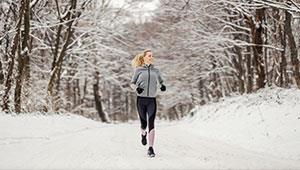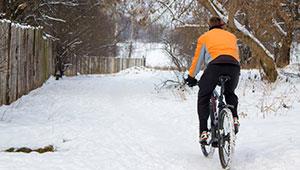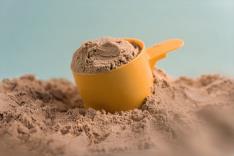
Regardless of what level or type of cyclist you are—recreational or professional, mountain bike or road—there's a good chance you're looking to improve, and training harder and smarter are the best ways to do so. Once you've started a proper training plan, dialing in your diet is the next biggest step to improving energy, body composition and recovery to gain a competitive edge. Here are a few special sports nutrition techniques to get you on your way.
Carb Loading
Marathon runners know the benefit of consuming above normal amounts of carbohydrates prior to big races. Cyclists should follow suit, as the act of carbohydrate loading does positively affect performance. This tactic should be reserved for big goal races or events, and consists of eating carbohydrates at the amount of 10 to 12 grams per kilogram of body weight for 48 hours leading up to the event.
Carbohydrate Rinse
It's well established that eating for rides lasting 90 minutes or more is beneficial for performance; but many cyclists ride less than that. Sweet spot, intervals and even crit races can all fall short of 90 minutes. That doesn't mean you get to ignore fueling. Giving your hard but short training sessions some carbohydrates will help your body hit higher intensities. Research shows that even swishing a carbohydrate drink in your mouth and spitting it out can boost improvement in a one-hour cycling test. This might be because carbohydrates begin to digest in the mouth, or that the act signals to the brain that sugar is present even when it isn't.
Caffeine
Drinking coffee is a big part of cycling culture. But did you know the caffeine supplied from your pre-ride cold brew or mid-ride cappuccino is likely making you a better cyclist? This performance-enhancing ability is due to caffeine's effect on the central nervous system to blunt pain, increase mood, reduce fatigue and improve mental cognition. Use this to your advantage by strategically placing caffeine intake before and throughout your ride. To get the biggest boost, keep in mind that caffeine takes about 30 to 45 minutes to take effect, and the magic amount seems to be 5 to 7 milligrams per kilogram.
Beet Juice
You've likely seen beet juice at the grocery store or on the menu at a trendy juice bar. You've also likely heard others whispering about it on a group ride. But have you actually tried drinking it? It might be time to start. Two cups (or the concentrated equivalent) can boost your performance by increasing a vasodilating substance, Nitric Oxide (NO), in the body. This helps increase blood flow to working muscles, allowing your mitochondria to produce ATP more efficiently and creating an anti-fatigue effect. This means you can do the same amount of work for longer periods with less stress to the body.
Bedtime Protein
Cyclists don't often think about building muscle, but having a leaner, more muscular body can create a more desirable power to weight ratio. Plus, building muscle isn't just about bulking up. It also refers to repairing muscle tissue that has been damaged thanks to hard training. Luckily there's a trick to boosting muscle gains that doesn't involve heavy lifting. Consuming a drink of 30-to 40 grams of slow digesting protein, such as casein protein, before bed can promote overnight muscle synthesis.
While these strategies can help boost performance, they vary based on the individual. These strategies should be thought of as "extras" and should not replace a solid training program and overall healthful diet. When looking to reach performance goals through nutrition, the best step is always to enlist the help of a trained sports dietitian.
READ THIS NEXT: 10 Bitter Foods That Cleanse the Body and Boost Performance








Discuss This Article